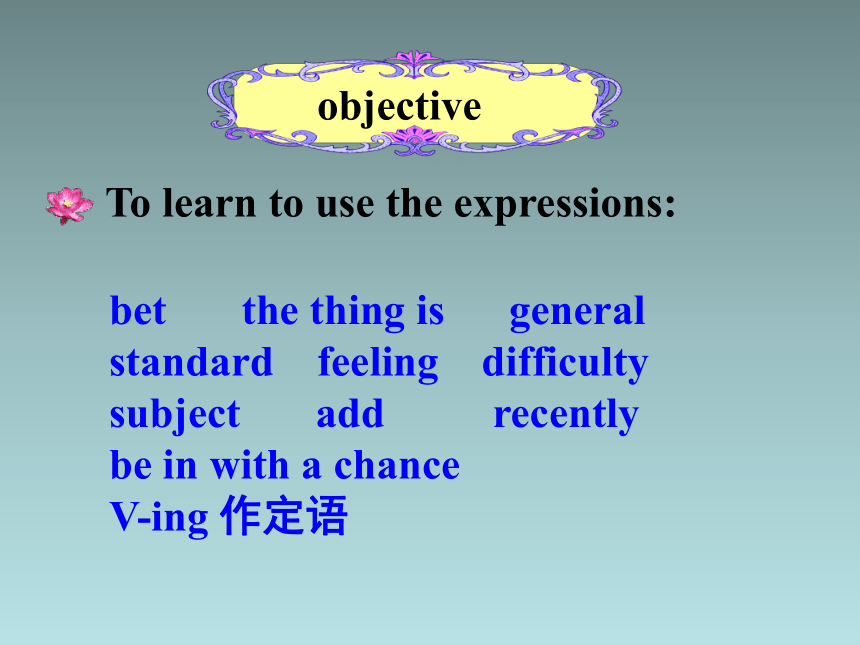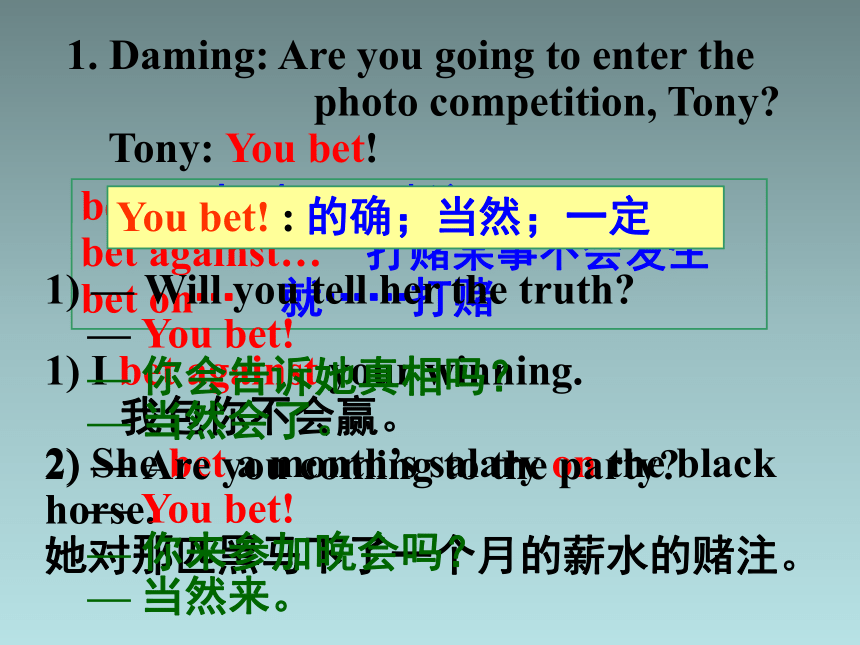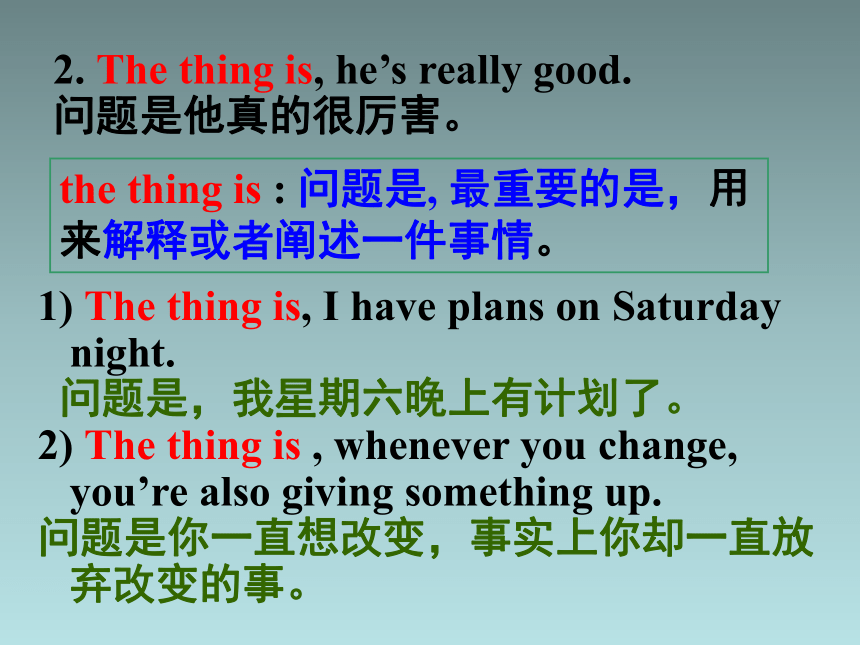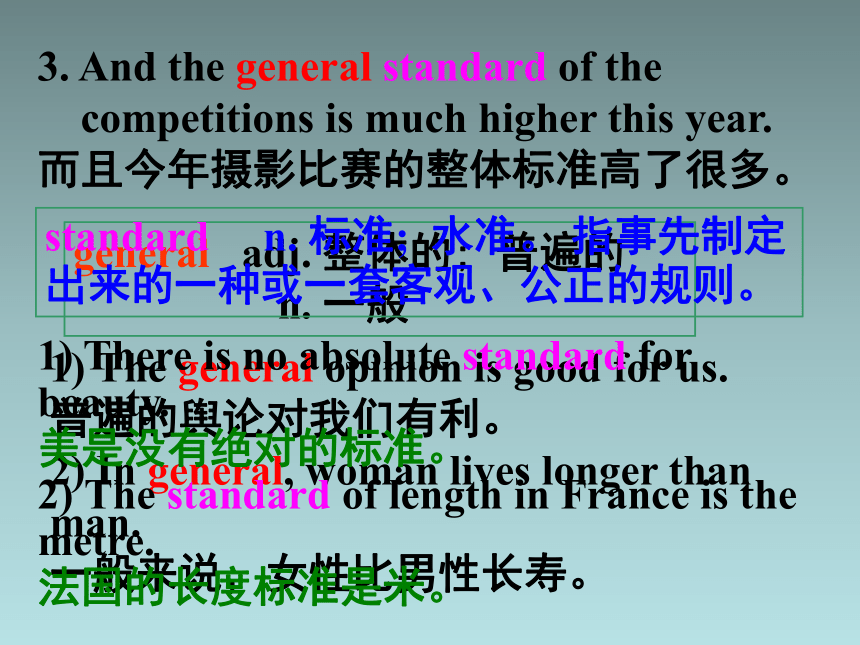外研版九年级英语上册课件 Module 11 Photos Unit 1(共15张PPT)
文档属性
| 名称 | 外研版九年级英语上册课件 Module 11 Photos Unit 1(共15张PPT) |  | |
| 格式 | ppt | ||
| 文件大小 | 592.5KB | ||
| 资源类型 | 教案 | ||
| 版本资源 | 外研版 | ||
| 科目 | 英语 | ||
| 更新时间 | 2022-08-11 16:59:57 | ||
图片预览







文档简介
(共15张PPT)
外研 九年级上
objective
To learn to use the expressions:
bet the thing is general standard feeling difficulty subject add recently
be in with a chance
V-ing 作定语
1. Daming: Are you going to enter the photo competition, Tony
Tony: You bet!
1) I bet against your winning.
我包你不会赢。
2) She bet a month’s salary on the black horse.
她对那匹黑马下了一个月的薪水的赌注。
bet v. 打赌;下赌注
bet against… 打赌某事不会发生
bet on… 就……打赌
1) — Will you tell her the truth
— You bet!
— 你会告诉她真相吗?
— 当然会了。
2) — Are you coming to the party
— You bet!
— 你来参加晚会吗?
— 当然来。
You bet! : 的确;当然;一定
1) The thing is, I have plans on Saturday night.
问题是,我星期六晚上有计划了。
2) The thing is , whenever you change, you’re also giving something up.
问题是你一直想改变,事实上你却一直放弃改变的事。
2. The thing is, he’s really good.
问题是他真的很厉害。
the thing is : 问题是, 最重要的是,用来解释或者阐述一件事情。
3. And the general standard of the
competitions is much higher this year.
而且今年摄影比赛的整体标准高了很多。
1) The general opinion is good for us.
普遍的舆论对我们有利。
2) In general, woman lives longer than man.
一般来说,女性比男性长寿。
general adj. 整体的; 普遍的
n. 一般
1) There is no absolute standard for beauty.
美是没有绝对的标准。
2) The standard of length in France is the metre.
法国的长度标准是米。
standard n. 标准; 水准。 指事先制定出来的一种或一套客观、公正的规则。
1)I’ve lost feeling in my hands.
我的双手失去了知觉。
2)The child has a natural feeling for music.
这个小孩对音乐具有一种天然的感受力。
4. I have a feeling that we can solve these little difficulties.
我感觉我们能解决这些小问题。
feeling n. 感觉; 知觉; 直觉看法
1) He faced the difficulty with courage.
他勇敢地面对困难。
2) I had difficulty in getting the ink off my skirt.
我很难把衬衣上的墨水洗掉。
difficulty: difficult的名词形式,既可作可数名词, 也可作不可数名词:
当difficulty表示抽象的“困难”、“费力” 时,是一个不可数名词;当指具体的“难题”、“难处”时,是一个可数名词。
have difficulty (in) doing sth
做某事有困难(其中in可省略)
5. What are the subjects that they’ve chosen for this year’s competition
他们为今年选择的比赛主题是什么?
1) This is a book on the subject of love.
这是一部以爱情为主题的书。
2) What is the subject of the poem
这首诗的题目是什么
subject n. 主题; 话题; 科目
subject 着重指文章、书籍、画或谈话等所涉及对象的题目或主题。
6. Take some photos of Beijing and add some photos of Cambridge that you took recently.
你可以拍一些北京的照片,再加上一些最近拍的剑桥的照片。
add v. 添加
add ... to 把……加到……上
1) The drink will be too sweet if you add more sugar.
如果你再加糖,这杯饮料就太甜了。
2) She added sugar to her tea.
她在茶里加了糖。
1) The book was published recently.
这本书刚出版。
2)I have seen him quite recently.
我最近见过他。
recently:最近、近来。
①表示不久前的一个时间位置时,与一般过去时连用。
②表示从过去不久延续到现在的一段时间,与现在完成时连用。
7. I’m sure you’re in with a chance!
我肯定你有获胜的机会!
be in with a chance是非正式英式英语,表示“有可能;有机会”。
1) I think I’m in with a chance of getting the job.
我认为我有可能获得这份工作。
2) I think we’re in with a good chance of beating them.
我认为我们很有可能打败他们。
8. What about that photo of my cousin
flying kites with Chinese kids …
我堂弟在颐和园和中国小孩放风筝的那张照片怎么样?
V-ing短语(flying kites …)作定语要放在被修饰词(my cousin)之后。
注意:单个V-ing作定语常放在被修饰词之前。如:
China is a developing country.
1) They lived in a room facing the street.
他们以前住在一个临街的房间里。
2) His brother, working as a teacher, lives in Beijing.
他那个当教师的哥哥住在北京。
1) The man reading a novel is my father.
= The man who is reading a novel is my father.
2) His brother, working as a teacher, lives in Beijing.
= His brother, who is working as a teacher, lives in Beijing.
拓展
V-ing作定语,意义上相当于一个定语从句,表示正在进行的动作或主动的动作。
Ⅰ. 根据提示写出正确的单词。
1. Please look at the m____ (菜单) and
choose what you would like to eat.
2. Please a____ (添加) some salt to the
chicken noodle soup.
3. We were all interested in the s_______
(主题) except Linda.
4. Mr Wang didn’t go back to his home
town r_______ (最近).
5. I passed the exam and it gave me a
strong f______ (感觉) of pride.
enu
dd
ubject
ecently
eeling
1. 这次歌唱比赛的整体水准不高。
The _______ _________ of the singing
competition isn’t high.
2. — 王帅太忙了!
— 没关系,我们可以请马涛帮忙。
— Wang Shuai is too busy!
—____ _______ _______. We can ask
Ma Tao to help us.
3. 我觉得你有机会进入校篮球队。
I think you ____ ___ _____ ___ _______
of entering the school basketball team.
general standard
It doesn’t matter
are in with a chance
Ⅱ. 根据汉语提示完成句子(每空一词)。
外研 九年级上
objective
To learn to use the expressions:
bet the thing is general standard feeling difficulty subject add recently
be in with a chance
V-ing 作定语
1. Daming: Are you going to enter the photo competition, Tony
Tony: You bet!
1) I bet against your winning.
我包你不会赢。
2) She bet a month’s salary on the black horse.
她对那匹黑马下了一个月的薪水的赌注。
bet v. 打赌;下赌注
bet against… 打赌某事不会发生
bet on… 就……打赌
1) — Will you tell her the truth
— You bet!
— 你会告诉她真相吗?
— 当然会了。
2) — Are you coming to the party
— You bet!
— 你来参加晚会吗?
— 当然来。
You bet! : 的确;当然;一定
1) The thing is, I have plans on Saturday night.
问题是,我星期六晚上有计划了。
2) The thing is , whenever you change, you’re also giving something up.
问题是你一直想改变,事实上你却一直放弃改变的事。
2. The thing is, he’s really good.
问题是他真的很厉害。
the thing is : 问题是, 最重要的是,用来解释或者阐述一件事情。
3. And the general standard of the
competitions is much higher this year.
而且今年摄影比赛的整体标准高了很多。
1) The general opinion is good for us.
普遍的舆论对我们有利。
2) In general, woman lives longer than man.
一般来说,女性比男性长寿。
general adj. 整体的; 普遍的
n. 一般
1) There is no absolute standard for beauty.
美是没有绝对的标准。
2) The standard of length in France is the metre.
法国的长度标准是米。
standard n. 标准; 水准。 指事先制定出来的一种或一套客观、公正的规则。
1)I’ve lost feeling in my hands.
我的双手失去了知觉。
2)The child has a natural feeling for music.
这个小孩对音乐具有一种天然的感受力。
4. I have a feeling that we can solve these little difficulties.
我感觉我们能解决这些小问题。
feeling n. 感觉; 知觉; 直觉看法
1) He faced the difficulty with courage.
他勇敢地面对困难。
2) I had difficulty in getting the ink off my skirt.
我很难把衬衣上的墨水洗掉。
difficulty: difficult的名词形式,既可作可数名词, 也可作不可数名词:
当difficulty表示抽象的“困难”、“费力” 时,是一个不可数名词;当指具体的“难题”、“难处”时,是一个可数名词。
have difficulty (in) doing sth
做某事有困难(其中in可省略)
5. What are the subjects that they’ve chosen for this year’s competition
他们为今年选择的比赛主题是什么?
1) This is a book on the subject of love.
这是一部以爱情为主题的书。
2) What is the subject of the poem
这首诗的题目是什么
subject n. 主题; 话题; 科目
subject 着重指文章、书籍、画或谈话等所涉及对象的题目或主题。
6. Take some photos of Beijing and add some photos of Cambridge that you took recently.
你可以拍一些北京的照片,再加上一些最近拍的剑桥的照片。
add v. 添加
add ... to 把……加到……上
1) The drink will be too sweet if you add more sugar.
如果你再加糖,这杯饮料就太甜了。
2) She added sugar to her tea.
她在茶里加了糖。
1) The book was published recently.
这本书刚出版。
2)I have seen him quite recently.
我最近见过他。
recently:最近、近来。
①表示不久前的一个时间位置时,与一般过去时连用。
②表示从过去不久延续到现在的一段时间,与现在完成时连用。
7. I’m sure you’re in with a chance!
我肯定你有获胜的机会!
be in with a chance是非正式英式英语,表示“有可能;有机会”。
1) I think I’m in with a chance of getting the job.
我认为我有可能获得这份工作。
2) I think we’re in with a good chance of beating them.
我认为我们很有可能打败他们。
8. What about that photo of my cousin
flying kites with Chinese kids …
我堂弟在颐和园和中国小孩放风筝的那张照片怎么样?
V-ing短语(flying kites …)作定语要放在被修饰词(my cousin)之后。
注意:单个V-ing作定语常放在被修饰词之前。如:
China is a developing country.
1) They lived in a room facing the street.
他们以前住在一个临街的房间里。
2) His brother, working as a teacher, lives in Beijing.
他那个当教师的哥哥住在北京。
1) The man reading a novel is my father.
= The man who is reading a novel is my father.
2) His brother, working as a teacher, lives in Beijing.
= His brother, who is working as a teacher, lives in Beijing.
拓展
V-ing作定语,意义上相当于一个定语从句,表示正在进行的动作或主动的动作。
Ⅰ. 根据提示写出正确的单词。
1. Please look at the m____ (菜单) and
choose what you would like to eat.
2. Please a____ (添加) some salt to the
chicken noodle soup.
3. We were all interested in the s_______
(主题) except Linda.
4. Mr Wang didn’t go back to his home
town r_______ (最近).
5. I passed the exam and it gave me a
strong f______ (感觉) of pride.
enu
dd
ubject
ecently
eeling
1. 这次歌唱比赛的整体水准不高。
The _______ _________ of the singing
competition isn’t high.
2. — 王帅太忙了!
— 没关系,我们可以请马涛帮忙。
— Wang Shuai is too busy!
—____ _______ _______. We can ask
Ma Tao to help us.
3. 我觉得你有机会进入校篮球队。
I think you ____ ___ _____ ___ _______
of entering the school basketball team.
general standard
It doesn’t matter
are in with a chance
Ⅱ. 根据汉语提示完成句子(每空一词)。
同课章节目录
- Module 1 Wonders of the world
- Unit 1 It's more than 2,000 years old.
- Unit 2 The Grand Canyon was not just big.
- Unit 3 Language in use
- Module 2 Public holidays
- Unit 1 My family always go somewhere interesting a
- Unit 2 We have celebrated the festival since the f
- Unit 3 Language in use
- Module 3 Heroes
- Unit 1 She trained hard,so she became a great play
- Unit 2There were few doctors, so he had to work ve
- Unit 3 Language in use
- Module 4 Home alone
- Unit 1 I can look after myself, although it won’t
- Unit 2 I became so bored with their orders that I
- Unit 3 Language in use
- Module 5 Museums
- Unit 1 Don't cross that rope!
- Unit 2 If you ever go to London, make sure you vis
- Unit 3 Language in use
- Module 6 Problems
- Unit 1 If I start after dinner, I'll finish it be
- Unit 2 If you tell him the truth now, you will sho
- Unit 3 Language in use
- Revision Module A
- Module 7 Great books
- Unit 1 We're still influenced by Confucius's idea
- Unit 2 It is still read and loved.
- Unit 3 Language in use
- Module 8 Sports life
- Unit 1 Daming wasn't chosen for the team last time
- Unit 2 He was invited to competitions around the w
- Unit 3 Language in use
- Module 9 Great inventions
- Unit 1 Will computers be used more than books in t
- Unit 2 Will books be replaced by the Internet?
- Unit 3 Language in use
- Module 10 Australia
- Unit 1 I have some photos that I took in Australia
- Unit 2 The game that they like most is Australian
- Unit 3 Language in use
- Module 11 Photos
- Unit 1 He's the boy who won the photo competition
- Unit 2 The photo which we liked best was taken by
- Unit 3 Language in use
- Module 12 Save our world
- Unit 1 If everyone starts to do something, the wor
- Unit 2 Repeat these three words daily: reduce, reu
- Unit 3 Language in use
- Revision Module B
